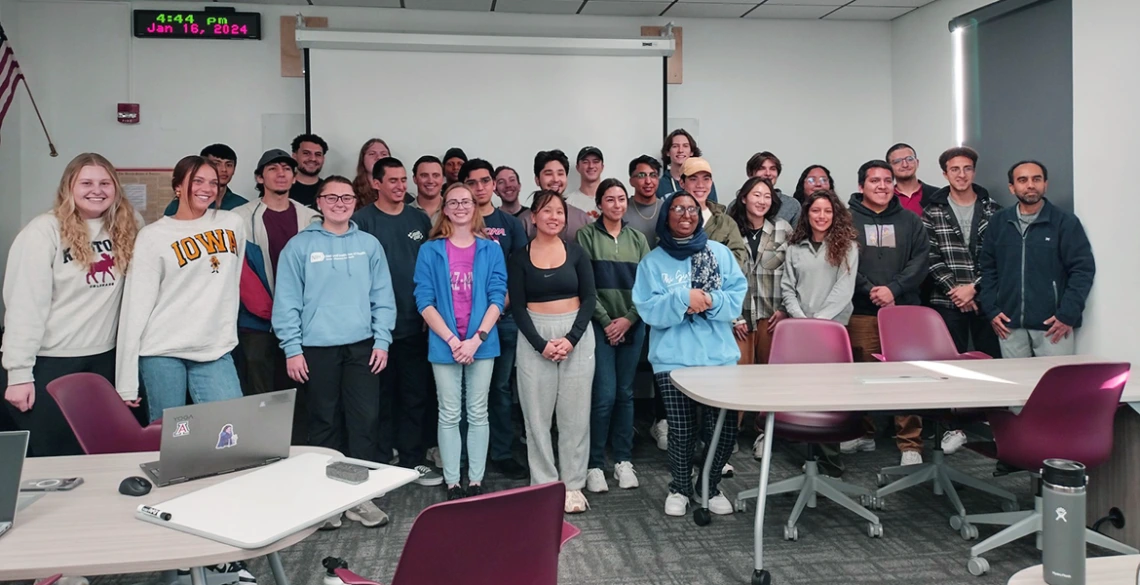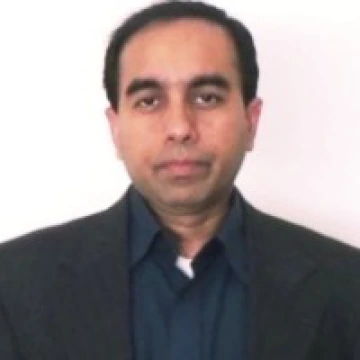One-on-One with Mentor Sardar Mostofa

Sardar Mostofa, in the front row at the far right, is pictured with the students he teaches in ENGR 498. The class is composed of the six teams he is mentoring this academic year.
Sardar Mostofa is a first-year mentor with over two decades of experience in product development, manufacturing and quality and regulatory compliance. His previous roles include serving as lead product development engineer, project leader, operations manager, director and VP of quality and regulatory affairs. Mostofa earned a master’s in management information systems from the University of Illinois and a bachelor’s in plastics engineering technology from Pittsburg State University.
Mostofa aims to continue contributing to the Interdisciplinary Capstone program’s success, particularly in the realm of health care and medical devices.

Sardar Mostofa
What inspired you to become a mentor?
My involvement stems from familiarity with the program. I have attended Craig M. Berge Design Day, sponsored a project and hired interns to permanent engineering roles.
Product development is a multidisciplinary process requiring expertise in engineering, project management, communication and leadership. Sharing my successful track record in innovative product development has become a passion that drives me to impart this knowledge to the next generation of engineers and leaders.
What is your personal experience of having a mentor?
Mentors play a crucial role in shaping one's path. Having had multiple mentors, I attribute my skills, perspective and innovative pursuits to their guidance. They have significantly influenced my professional growth.
How does being on a mentored design team help students in the professional world?
This is the best environment to gain exposure and experience doing real-life engineering projects. Students gain insights into the tools and techniques of product development and project management, as well as leadership skills. This program serves as a bridge between academia and the professional world; it has the power to set University of Arizona students apart from peers without this practical experience.
What’s your favorite team you have mentored, and why?
In my first year of mentoring, all my teams are favorites. My focus is on what students gain and how it aligns with the sponsoring organization. The greater the alignment, the better the outcome.
Describe a moment when you saw clearly how students benefit from mentorship.
Having hired UA engineering graduates in the past, I was impressed by their quick understanding of research and development concepts. However, it wasn't until I took on the mentor role that I grasped the crucial role of the ENGR 498 course in shaping students’ skills and knowledge. The program stands out in its ability to transform the challenging endeavor of new product development into manageable milestones, essentially constructing a comprehensive road map to follow. I commend lead instructor Steve Larimore for his dedication and passion, which is pivotal in ensuring cohesion across all sections.
What advice would you offer to others considering mentoring a design team?
Mentoring is an opportunity to contribute to the growth of future professionals. It is a powerful way to leave a lasting legacy by sharing your knowledge and passion. Innovation does not just happen suddenly; it’s an incremental process, through identifying gaps and connecting the dots. Your experience and knowledge may help connect some dots.
How do employers benefit when they hire students who have been on a mentored senior design team?
The program offers many stories of achievement for the students and industries. Graduates are already exposed to hands-on real-life projects, products and methodologies. Employers can significantly reduce training time, gaining employees who are ready for the challenges of the professional world.
Tell us something about yourself that people might be surprised to learn.
I have participated in several half-marathons, volunteered as division director at Toastmasters International, engaged in competitive speaking, and authored a couple of books on creative thinking and public speaking.

